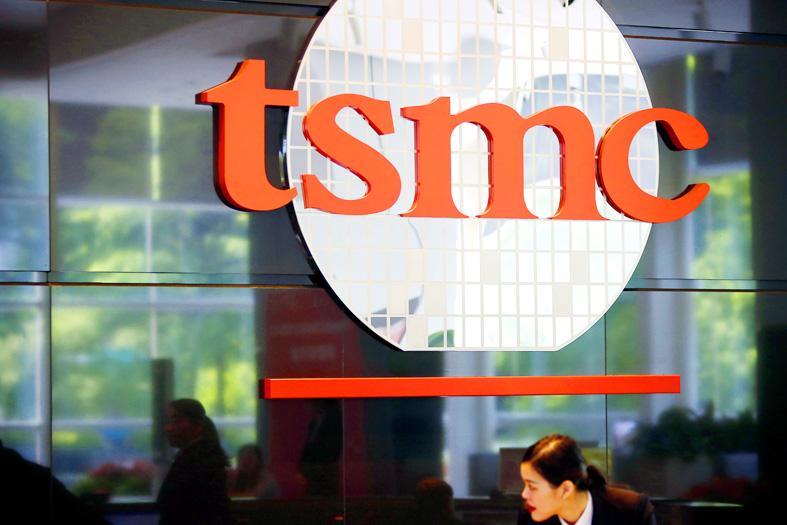Taiwan Semiconductor Manufacturing Co (TSMC, 台積電) yesterday said that its board of directors has approved the issuance of US$1 billion of unsecured bonds in Taiwan and up to US$8 billion of bonds in the US to fund its capacity expansion.
The chipmaker told investors last month that it plans to invest US$8 billion in a 12-inch fab in Arizona over the next three years, a part of its US$12 billion investment in the US from this year to 2029.
The Arizona fab is under construction and is to start producing 5-nanometer chips in the first quarter of 2024, it said.

Photo: Bloomberg
TSMC has raised its capital spending for this year to US$30 billion, with 80 percent of the amount earmarked for advanced technology capacity expansion that includes 3-nanometer, 5-nanometer and 7-nanometer technologies in Taiwan.
The board approved capital appropriations of about US$17.57 billion for the installation of advanced, mature and specialty technology capacity, as well as the installation and upgrade of advanced packaging capacity, TSMC said in a statement.
The funds will also cover research and development, and capital expenditure for next quarter.
The directors also ratified a donation of 5 million doses of the Pfizer-BioNTech COVID-19 vaccine to the Centers for Disease Control to help curb a domestic virus outbreak.
The overall cost of the donation is estimated at US$175 million, including vaccine procurement, cold-chain logistics, handling services and insurance, it said.
The board also approved a proposal to pay a cash dividend of NT$2.75 per share for the second quarter of this year.
In a separate statement, TSMC said its revenue contracted 16.1 percent to NT$124.56 billion (US$4.48 billion) last month from NT$148.47 billion in June.
On an annual basis, revenue expanded 17.5 percent from NT$105.96 billion.
Consolidated revenue expanded 18.1 percent to NT$859.11 billion in the first seven months of this year, compared with NT$727.26 billion in the same period last year.

South Korea’s equity benchmark yesterday crossed a new milestone just a month after surpassing the once-unthinkable 5,000 mark as surging global memory demand powers the country’s biggest chipmakers. The KOSPI advanced as much as 2.6 percent to a record 6,123, with Samsung Electronics Co and SK Hynix Inc each gaining more than 2 percent. With the benchmark now up 45 percent this year, South Korea’s stock market capitalization has also moved past France’s, following last month’s overtaking of Germany’s. Long overlooked by foreign funds, despite being undervalued, South Korean stocks have now emerged as clear winners in the global market. The so-called “artificial intelligence

NEW IDENTITY: Known for its software, India has expanded into hardware, with its semiconductor industry growing from US$38bn in 2023 to US$45bn to US$50bn India on Saturday inaugurated its first semiconductor assembly and test facility, a milestone in the government’s push to reduce dependence on foreign chipmakers and stake a claim in a sector dominated by China. Indian Prime Minister Narendra Modi opened US firm Micron Technology Inc’s semiconductor assembly, test and packaging unit in his home state of Gujarat, hailing the “dawn of a new era” for India’s technology ambitions. “When young Indians look back in the future, they will see this decade as the turning point in our tech future,” Modi told the event, which was broadcast on his YouTube channel. The plant would convert

‘SEISMIC SHIFT’: The researcher forecast there would be about 1.1 billion mobile shipments this year, down from 1.26 billion the prior year and erasing years of gains The global smartphone market is expected to contract 12.9 percent this year due to the unprecedented memorychip shortage, marking “a crisis like no other,” researcher International Data Corp (IDC) said. The new forecast, a dramatic revision down from earlier estimates, gives the latest accounting of the ongoing memory crunch that is affecting every corner of the electronics industry. The demand for advanced memory to power artificial intelligence (AI) tasks has drained global supply until well into next year and jeopardizes the business model of many smartphone makers. IDC forecast about 1.1 billion mobile shipments this year, down from 1.26 billion the prior

People stand in a Pokemon store in Tokyo on Thursday. One of the world highest-grossing franchises is celebrated its 30th anniversary yesterday.